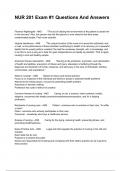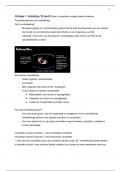Tentamen (uitwerkingen)
NUR 201 Exam #1 Questions And Answers
- Vak
- NUR 201
- Instelling
- Jersey College Of Nursing
Florence Nightingale - ANS "The act of utilizing the environment of the patient to assist him in his recovery" Also, this person was the first person to ever observe that dirty areas contaminated people. First nurse scientist. Virginia Henderson - ANS "The unique function of the ...
[Meer zien]




